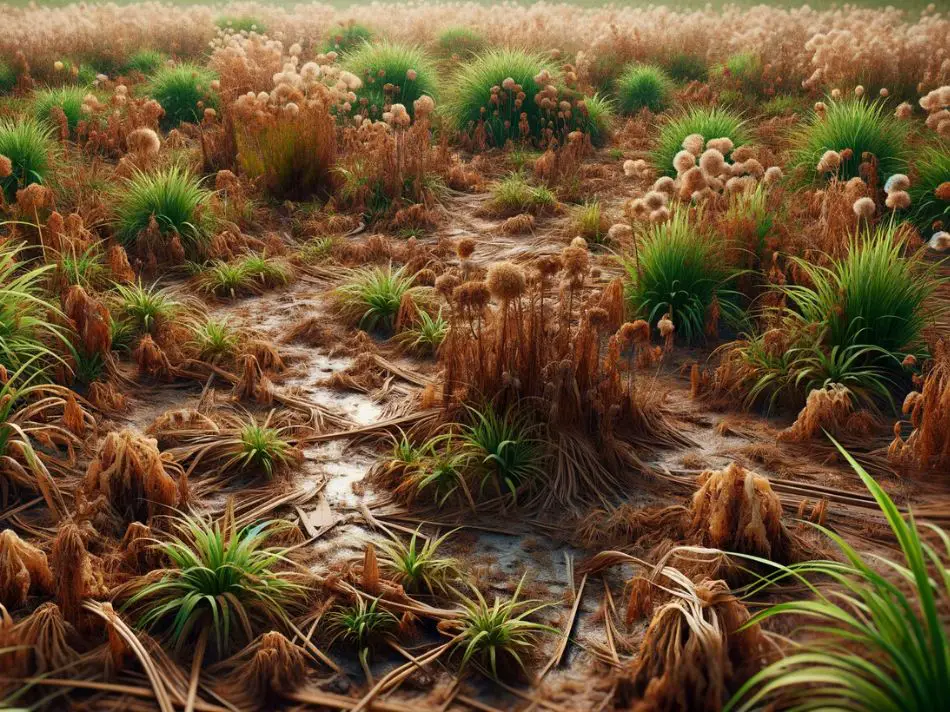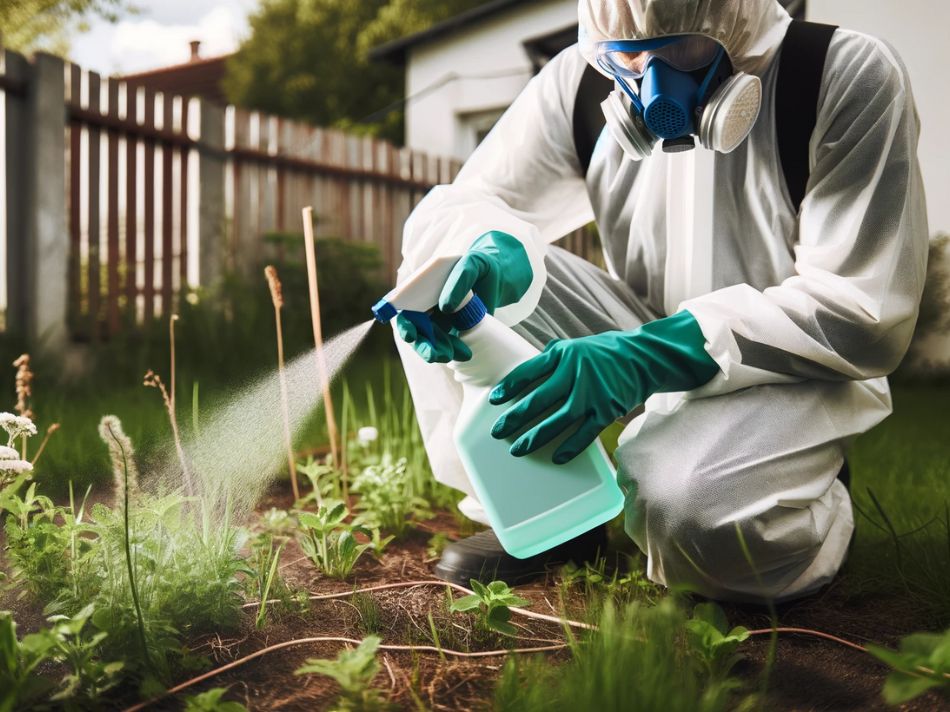Gardening enthusiasts often seek effective solutions for weed control, leading to a common inquiry: can ammonia, a household chemical, be used as a grass and weed killer?
Yes, ammonia can kill grass and weeds due to its high nitrogen content. However, it’s non-selective and can harm desirable plants and disrupt soil health. While effective in weed eradication, its potential environmental impact and risk to other garden plants make it a less advisable option for weed control.
This article delves into the complexities surrounding the use of ammonia in gardens. While some advocate for its effectiveness against weeds, others raise concerns about its impact on grass and overall garden health.
| Key Takeaways | Details |
|---|---|
| Ammonia’s Dual Role | Ammonia can act as a weed killer due to its high nitrogen content, but it can also harm grass and other plants. |
| Risks Outweigh Benefits | The potential damage to plants and soil, along with environmental concerns, makes ammonia a less desirable option for weed control. |
| Environmental Concerns | Ammonia can disrupt soil pH, harm aquatic life through runoff, and lead to bioaccumulation in the soil. |
| Safer Alternatives Available | Options like vinegar-based herbicides, mulching, and manual weeding are safer and more environmentally friendly. |
| Expert and Gardener Consensus | Most gardening experts and experienced gardeners advise against using ammonia due to its non-selective nature and ecological risks. |
| Importance of Sustainable Practices | Emphasis on maintaining a healthy garden ecosystem by choosing weed control methods that are safe for the environment. |
| Careful Consideration Required | If choosing to use ammonia, it should be highly diluted and applied with caution, considering protective measures and potential long-term effects. |
What is Ammonia? Understanding the Chemical

Ammonia, a compound of nitrogen and hydrogen (NH3), is commonly found in household cleaning products. Known for its pungent smell, ammonia is used in various applications, from cleaning agents to fertilizers.
In gardening, its high nitrogen content draws interest, as nitrogen is a vital nutrient for plant growth. However, the form of ammonia used in households differs significantly from agricultural-grade ammonia.
This distinction is crucial when considering ammonia for garden use, as its concentration and formulation can have varied effects on plant life. Understanding these differences is key to evaluating ammonia’s suitability as a weed and grass control agent.
How Ammonia Affects Plants: The Science Explained
Ammonia’s impact on plants is primarily due to its high nitrogen content. Nitrogen is essential for plant growth, contributing to chlorophyll production and overall health. However, the concentration of nitrogen in ammonia can be a double-edged sword.
While it can promote growth when used in controlled amounts, excessive nitrogen can harm plants. In the case of ammonia, its form as a caustic cleaning agent means it is highly concentrated and can lead to nitrogen burn.
This phenomenon occurs when plants absorb too much nitrogen, leading to yellowing leaves and stunted growth. Furthermore, ammonia’s alkaline nature can disrupt soil pH balance, adversely affecting plant health.
Understanding these effects is crucial for gardeners considering ammonia as a weed control solution, as its application can inadvertently damage the very plants they wish to nurture.
Ammonia as a Weed Killer: Pros and Cons
The use of ammonia as a weed killer presents a mix of potential benefits and significant risks. On the one hand, ammonia’s strong nitrogen content can effectively kill weeds by causing nitrogen burn. This makes it a tempting option for quick weed eradication.
Additionally, as a common household item, ammonia is readily available and inexpensive compared to specialized herbicides.
However, the cons of using ammonia in gardens are substantial. Its non-selective nature means it does not discriminate between weeds and desirable plants. This can result in collateral damage to grass and other garden plants.
Moreover, ammonia’s high pH level can lead to soil alkalinity, making the environment unsuitable for most plants. The risk of ammonia runoff into waterways is another concern, as it can lead to environmental pollution and harm aquatic life.
Given these risks, many gardeners and experts advise against using ammonia for weed control. The potential for harm often outweighs the benefits, especially when safer, more targeted alternatives are available.
Comparative Analysis: Ammonia vs. Commercial Herbicides
| Aspect | Ammonia | Commercial Herbicides |
|---|---|---|
| Effectiveness | High (non-selective) | Varies (targeted options) |
| Safety | Low (harmful to all plants) | Higher (selective options) |
| Cost | Low (common household item) | Moderate to high |
| Environmental Impact | High (risk of soil damage and runoff) | Varies (some eco-friendly options available) |
| Application | Non-specific, high risk | Targeted, lower risk |
This table compares ammonia with commercial herbicides across various factors. While ammonia is effective and low-cost, its safety and environmental impact are concerning.
Commercial herbicides, although potentially more expensive, offer targeted and safer options for weed control.
Real-Life Experiences: Case Studies and Testimonials
Exploring real-life experiences provides valuable insights into the use of ammonia as a weed killer.
One gardener reported success in eliminating tough weeds using diluted ammonia but noted the unintentional damage to nearby grass.
Another shared a contrasting experience, where ammonia application led to soil imbalance and poor plant health in subsequent seasons.
Testimonials from a community gardening forum reveal mixed outcomes. Some found ammonia effective for spot treatments, while others cautioned against its use, citing environmental concerns and damage to garden ecosystems.
These varied experiences highlight the unpredictable nature of ammonia as a weed control method.
These case studies and testimonials underscore the importance of careful consideration and research before using ammonia in gardens. They also emphasize the value of understanding individual garden conditions and the potential long-term effects of such practices.
Safe Application of Ammonia: Guidelines and Precautions
If gardeners choose to use ammonia, adhering to strict safety guidelines is imperative. First, dilute ammonia significantly to reduce its concentration.
A recommended ratio is one part ammonia to seven parts water. Even with dilution, apply it sparingly and only on targeted weed areas to minimize harm to surrounding plants.
Wearing protective gear, such as gloves and goggles, is crucial to avoid skin and eye irritation. Additionally, applying ammonia on a calm day reduces the risk of inhalation and prevents drift to unintended areas.
It’s also essential to consider the timing of application. Early morning or late evening applications can reduce the impact on beneficial insects and neighboring plants. However, gardeners should be aware that repeated use of ammonia can lead to soil imbalances and should monitor their garden’s health closely.
Following these guidelines can mitigate some risks, but gardeners should weigh these against the potential long-term consequences and explore safer alternatives.
Alternative Weed Control Methods: Natural and Chemical Solutions
For gardeners seeking alternatives to ammonia for weed control, several options are available:
- Vinegar-Based Herbicides: Acetic acid in vinegar can effectively kill weeds, especially when used in higher concentrations.
- Corn Gluten Meal: A natural pre-emergent herbicide, it prevents weed seeds from germinating.
- Mulching: Applying a layer of mulch suppresses weed growth by blocking sunlight.
- Boiling Water: Pouring boiling water directly on weeds can kill them without harming the environment.
- Selective Herbicides: These target specific weed species while sparing desired plants.
- Manual Weeding: Labor-intensive but highly effective and environmentally friendly.
- Flame Weeding: Uses a controlled flame to kill weeds without chemicals.
- Salt: Used sparingly, salt can dehydrate and kill weeds but should be used with caution due to soil salinity risks.
Each method has its advantages and limitations, and the choice depends on the specific needs of the garden and the gardener’s environmental considerations.
The Environmental Impact of Using Ammonia in Gardening

The environmental impact of using ammonia in gardening is a significant concern. When applied to soil, ammonia can lead to increased alkalinity, disrupting the natural pH balance and making the soil inhospitable for many plants.
This imbalance can take years to correct and may require substantial soil amendments.
Moreover, ammonia runoff is a critical environmental issue. When it leaches into waterways, it can cause eutrophication, leading to excessive algae growth and depletion of oxygen in aquatic ecosystems. This process can harm fish and other aquatic life, disrupting local biodiversity.
The potential for ammonia to bioaccumulate in the soil is another concern. Repeated applications can lead to a buildup of ammonia in the soil, posing long-term risks to plant health and soil quality.
These environmental considerations are crucial for gardeners to understand before deciding to use ammonia as a weed control method.
Expert Opinions: What Do Gardeners and Scientists Say?
Gardening experts and scientists generally advise caution or outright avoidance of ammonia for weed control. Many highlight the risks to plant health and soil quality, emphasizing that the potential damage often outweighs the benefits.
Experts point out that while ammonia can kill weeds, its non-selective nature and harmful environmental impact make it an unsuitable choice for most gardens.
Scientists also note the ecological risks associated with ammonia use, particularly its potential to disrupt local ecosystems and harm wildlife. They advocate for more sustainable and targeted approaches to weed control, emphasizing the importance of maintaining ecological balance in gardens.
Gardening forums and expert columns frequently recommend exploring safer, more environmentally friendly alternatives. These include natural herbicides, manual weeding, and cultural practices like mulching.
The consensus is clear: while ammonia may offer a quick fix, its long-term consequences for gardens and the environment make it a less desirable option.
Conclusion: Weighing the Risks and Benefits (150 words)
In conclusion, while ammonia can be an effective weed killer, its use in gardens is fraught with risks. Its non-selective nature, potential to harm desirable plants, and negative environmental impact are significant concerns.
The insights from real-life experiences, expert opinions, and scientific research all point towards the need for caution. Gardeners must carefully consider the immediate effectiveness of ammonia against its long-term consequences on soil health, plant vitality, and environmental well-being.
Given the array of safer alternatives available, it is advisable to explore other weed control methods that align with sustainable gardening practices. Whether opting for natural solutions or selective herbicides, the goal should be to maintain a healthy, balanced garden ecosystem.
Ultimately, the decision to use ammonia should be made with a thorough understanding of its implications, ensuring that immediate weed control needs do not compromise the garden’s future health and biodiversity.
FAQs
- Can ammonia completely kill weeds?
- Yes, ammonia can kill weeds, but it’s non-selective and may harm other plants.
- Is ammonia safe for all types of gardens?
- No, ammonia can disrupt soil pH and is not safe for all garden types.
- How often can I use ammonia in my garden?
- Frequent use is not recommended due to the risk of soil bioaccumulation and imbalance.
- Are there any safe ways to use ammonia for weed control?
- If used, it should be highly diluted and applied sparingly, with protective measures.
- What are the environmental risks of using ammonia in gardens?
- Ammonia can lead to soil alkalinity, harm aquatic life through runoff, and disrupt ecosystems.
- Can ammonia affect the growth of other plants?
- Yes, ammonia can damage or kill nearby plants due to its high nitrogen content and causticity.


